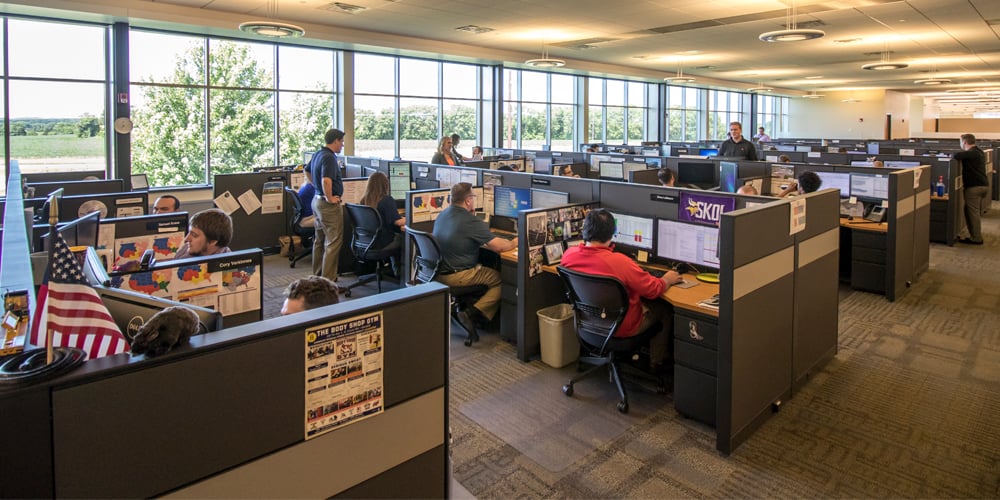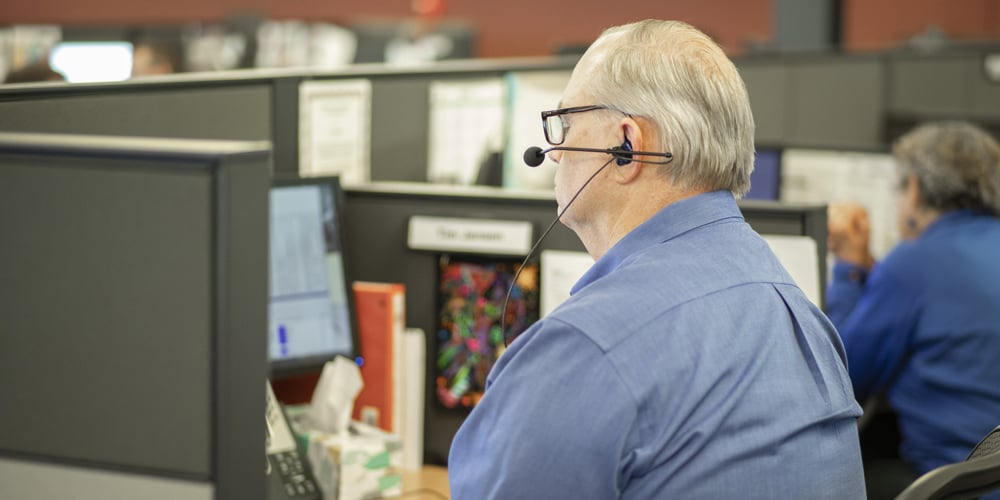 As you explore career opportunities, you might be faced with a decision between a few different types of work environments. While some businesses are still allowing employees to work from home, many are transitioning their employees back into the office — or at least a hybrid of the two.
As you explore career opportunities, you might be faced with a decision between a few different types of work environments. While some businesses are still allowing employees to work from home, many are transitioning their employees back into the office — or at least a hybrid of the two.
If you’re looking at an in-office opportunity, what type of environment will you be working in? One of the more common types is a cubicle environment, although what that means can vary slightly between businesses.
Here at ATS, employees work in a cubicle environment, so we’re aware of the pros and cons that come with employees working alongside each other in this way.
Keep reading to learn more about the common cubicle environments you’ll encounter, along with the pros and cons of working in a cubicle setting.
What is a Cubicle Office Environment?
Cubicles are partitions that separate employee workspaces and typically range from four to six feet tall. Workspaces can vary from a four-foot single desk with a set of drawers to an eight-by-eight-foot space that includes a desk, a cabinet and drawers and maybe a chair or two for visitors.
The cubes themselves serve as the separators between teams. This creates flexibility for employers to adjust workspaces as teams grow.
Pros of a Cubicle Office Environment
Depending on your preconceived notions about what it’s like to work in a cube environment, you may discover some benefits you never considered, including:
- Increased productivity and collaboration
- Removal of hierarchy
- Ability to show your personality
You’ll be More Productive & Collaborative
One key stipulation with this pro is whether or not you have a job that relies on team collaboration. Instead of getting up and walking out of your office and into someone else’s — or picking up the phone and calling if you’re working from home — you can just turn around and ask a question. That time-savings will allow you to get back to work quicker and get more work done.
You Won’t See Unnecessary Hierarchy
A key to feeling like you’re receiving the same level of respect as your counterparts at work is removing any sense of favoritism. In the case of some office environments, where there aren’t enough offices for everyone, you’ll see desks or cubes too. And, depending on your leadership structure, who gets an office and who doesn’t is determined by “unwritten rules.”
Essentially, that could mean your coworker gets an office over you simply because a certain manager likes them better. That’s not fair. It also creates unnecessary animosity between coworkers that may have gotten along just fine without something like this happening.
In a cube environment, everyone with the same title level gets the same setup. Maybe employees without direct reports get a desk, while managers get a larger cube setup. Any changes, in that case, are based on organizational structure and not someone’s mood on a certain day.
You Can Show Some of Your Personality
You spend enough of your life at work, so you might as well “make yourself at home.” Want to have some photos or artwork that allow you to think of your family? Some sports memorabilia to be able to share where your allegiances lie? Or maybe it’s just your favorite nicknacks. Whatever makes you happy, go ahead and do it — as long as it fits your company’s policies, of course.
Cons of a Cubicle Office Environment
A cubicle office setup isn’t for everyone, of course. While the pros might have you ready to start applying only to businesses that use this setup, there are a few cons to consider that might change your mind, including:
- It can be distracting
- It can reduce motivation
- It can increase the spread of illness
You Might Get Distracted More Easily
While working in a cube environment can help with collaboration, it can be pretty easy to flip the switch from talking about work-related things to talking about what you have going on next weekend. All of a sudden, 20 minutes go by and your quick question just prevented you from getting your work done on time.
 Beyond your teammates, if you’re someone who gets easily distracted by conversations happening outside your area, people walking by your desk or your coworker’s, we’ll call it “unique,” perfume, you might have a hard time getting work done.
Beyond your teammates, if you’re someone who gets easily distracted by conversations happening outside your area, people walking by your desk or your coworker’s, we’ll call it “unique,” perfume, you might have a hard time getting work done.
Noise-canceling headphones and a “tunnel-vision” skillset will be very helpful in a cubicle setting. It can take time, but being able to tune distractions out is something that can be learned.
You Might Lose Motivation
This con comes down to a lot of subconscious things that could impact you. What we mean is you don’t usually try to feel sad, anxious or upset over something else. But working openly close to others could leave you feeling that way.
Is your coworker sad or grumpy one day for some reason? If that coworker you love bouncing ideas off of or ribbing every now and then isn’t in the mood, that can bring you down too.
On a more positive note, if your “buddy” is in a goofy mood and wants to tell stories all day, you’ll want to join in. Your motivation to work will dwindle and you’ll just want to tell stories all day.
Finally, if you’re used to having a space of your own and enter an environment where you’re a few feet from your coworkers, you might feel a bit cramped. Instead of focusing on your work, you might be dealing with internal thoughts of how close you are to everyone else.
You Might Get Sick More Often
When you’re at home or in your own office and you’re not feeling well, you can just shut your door and close yourself off from the rest of your coworkers. While it’s a good idea to work from home (if that’s an option) or call in when you’re sick, that won’t prevent 100 percent of the spread of illness.
People don’t know they’re sick — and, therefore, contagious — until they get symptoms. In some cases, the symptoms don’t kick in until after the illness has been spread. If you’re working in a cubicle environment, your “neighbor” might be sick and not know it. The next thing you know, you’re both dealing with a nagging cold.
How to Be Courteous in a Cubicle Environment
Since you’re sharing a space with your coworkers, there are some things you should consider in order to be courteous to those working around you:
- Don’t use speakerphone
- Be quiet when others are on the phone (or a video conference)
- Find a conference room for an extended discussion

Don’t Use Speakerphone
This probably goes for anyone in a public space — yes, even you on your cellphone walking down the sidewalk — but you should avoid using speakerphone when around others.
It’s one thing if you’re in an office and you can shut your door — or at home by yourself — but if you’re a few feet from your coworker, they don’t need to hear your conversation. Just pick up the handset — or get a headset.
Be Quiet When Others Are on the Phone
It’s somewhat related to the previous point, but it’s good to keep quiet when others are on the phone. That doesn’t mean you can’t talk at all, but don’t yell across the aisle at your coworker. Get up and walk over to them and/or speak at a low volume.
The same goes for someone who is on a video conference, which is happening more often these days. They might be on mute, so others on the call might not hear you, but the person on the call right next to you might have a hard time hearing what they’re supposed to.
Find a Conference Room for an Extended Conversation
If your conversation is going to last more than a minute or two, find a conference room — especially if it’s a private conversation. Remember, others have work to do and will likely get distracted by your side chatter, even if they don’t appear to be distracted by it.
Pros and Cons of Working in a Cubicle Environment
While exploring career opportunities — or preparing to transition back into the office — it’s important to understand the pros and cons of working in a cubicle environment.
On a positive note, you’ll likely:
- Be more productive
- Won’t see unnecessary hierarchy
- Get to show off your “flair”
On the negative side, you might:
- Get distracted more easily
- Lost motivation
- Get sick more often
Just like anything, some of these pros won’t apply to you and some cons won’t either. Maybe you’re really good at focusing exclusively on the task at hand and distractions won’t be a factor. Or maybe your immune system is invincible and you never get sick (knock on wood).
Rather, use this list as a guide so you can decide if a cubicle environment has more pros than cons. Or maybe one of these cons is a dealbreaker and you won’t ever work in a cubicle environment. That’s up to you.
If you choose to pursue a career in a cubicle environment, just make sure you’re courteous to those around you. Don’t use speakerphone when making phone calls, be quiet when others are on the phone or a video conference and take your extended conversations into a conference room. You expect the same from your coworkers, so hold up your end of the bargain too.
Is a Cubicle Environment Right for You? Apply to ATS!
Here at ATS, we have a limited number of offices, reserved for vice president-level roles and above. Every other employee works in a cubicle setup, with the vast majority working at their own six-foot desk. Manager-level roles up to vice presidents get an eight-by-eight space that includes a bigger desk, drawers and chairs for visitors.
Who gets what type of workspace is determined exclusively by role, not by who had a better month on the sales floor.
If you’re interested in working in that type of environment, we invite you to learn more about what it’s like to work in the transportation industry — it might not be what you think!
Find the Right Career for You: Transportation Industry Job Matcher
If you’re already convinced that you’re ready to take the leap and apply, take a look at our open positions. We’d love to help you find the right fit!



